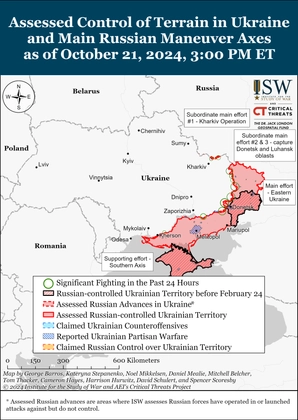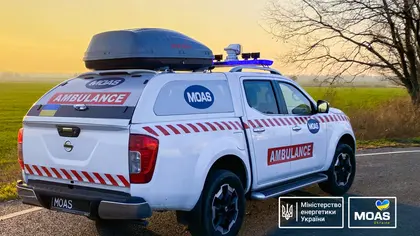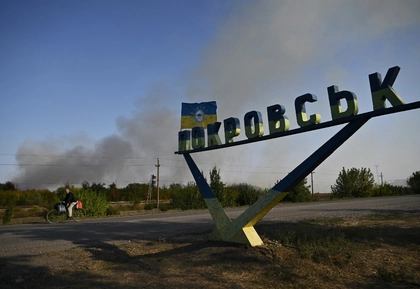Earlier this summer, I watched a critically wounded Ukrainian soldier called Oleh being gently lifted into one of our ambulances behind the frontline and evacuated to a hospital for emergency treatment. He was the latest of the 20,000 lives and counting we at MOAS (Migrant Offshore Aid Station) have saved during this devastating war.
Every day our medics treat mostly young men suffering from critical trauma injuries caused by shrapnel, mines, artillery fire, small arms, rocket systems, and other battlefield injuries.
JOIN US ON TELEGRAM
Follow our coverage of the war on the @Kyivpost_official.
The care Oleh received was a microcosm of the innovation that is coming to the international humanitarian sector. A decade ago, we were rescuing migrants in the Mediterranean. Today we are saving lives at the front line in Ukraine. Next comes hi-tech demining, also in Ukraine.
Disruption has come late to the humanitarian world. While it has already transformed an ever-growing number of sectors such as fintech, retail, media and entertainment, the game-changing deployment of new technologies and approaches has only started to scratch the surface of this lumbering leviathan.
In the humanitarian sphere, deep-seated problems and life-saving solutions can both be summarized under one heading: risk. Many, if not most, organizations shun risk. Rather than avoiding risk, however, we have embraced it, applying lessons learned in the private sector and putting them to effective use in the business of saving lives.

ISW Russian Offensive Campaign Assessment, October, 22, 2024
We go where other organizations are not comfortable… Most will not work alongside the military. It’s too risky. We figured that if that’s where the greatest requirement is, that’s where we’ll go.
After two decades supporting US military contractors with emergency assistance in bases all over the world, we have learned how to operate safely and successfully in the most challenging environments. In Ukraine, faced with prohibitively high insurance premiums that kept less risk-taking organizations out, we decided to underwrite our own life insurance. There was no other way.
In 2014, we went out on a limb, bought a rescue ship and pioneered the use of hi-tech drones to extend our visibility by 60 nautical miles, enabling us to save thousands more lives. While many NGOs instinctively resist cooperating with the authorities, especially the military, we put together one of the largest ever combined humanitarian operations at sea, working closely with foreign navies, air forces, coastguards and governments. Risky? Undoubtedly, but it worked. We saved lives, rescuing and assisting 38,421 people at sea.
Sometimes you need to take risks to make things happen. In 2017, we moved fast and arrived early in Bangladesh to build aid stations for the huge numbers of Rohingya fleeing slaughter in Myanmar. We then provided urgent medical care to 90,000 of the approximately 750,000 refugees who arrived. Anticipating the Russian invasion of Ukraine last year, we arrived before it began.
Alongside risk-aversion, lack of accountability is another chronic problem that continues to bedevil the humanitarian sector. Funds, goods and services often end up where they shouldn’t. Poor performance is rarely punished.
We are directly accountable to Ukraine’s military medics. If they don’t think we’re delivering, we don’t work for them anymore. It’s as simple as that – and I wouldn’t have it any other way. From the get-go, we have been taking the most critically injured soldiers from stabilization points just behind the frontline to emergency treatment in higher-level hospitals across eastern and southern Ukraine. We have driven millions of miles and saved tens of thousands of soldiers and civilians. Our professional, highly qualified and well-paid doctors haven’t lost a single soldier.
Large aid organizations often work with minimal consultation. At MOAS, we listen and learn. In Ukraine, we are guided by what Ukrainians tell us they need, not what we want to do. That’s why we go where other organizations are not comfortable to tread. Most will not work alongside the military. It’s too risky. We figured that if that’s where the greatest requirement is, that’s where we’ll go. Demand-led, not supply-side humanitarian aid.
Other failings need fixing. The humanitarian sector has a preference for “its own.” Expensive international expertise is routinely favored over local professionals. Apart from being wasteful, it sends an unmistakable signal: only we can fix your problems. Humanitarian workers should not be an elite, priestly class, wafting between five-star hotels and high-end restaurants in $100,000 Toyota Land Cruisers.
At MOAS, I’m the only full-time foreign member of our Ukraine team. Each of our 150 doctors, paramedics and drivers is Ukrainian. We depend on their experience and knowledge, not the other way round.
None of the failings I’ve mentioned here is a secret. The mystery is why they keep on being repeated. Last year, Afrah Nasser, a fellow of the Arab Center in Washington DC, published a blistering report on the failings of humanitarian aid to Yemen. It blasted the system’s “short-term solutions, counterproductive stances of neutrality and impartiality… and a lack of sufficient inclusion of Yemeni professionals.” Her critique applies far beyond that war-ravaged country.
And what about donors? We would argue that they should insist on far greater accountability from the organizations they help to fund. Good money should not go after bad if organizations are not delivering results on the ground. The humanitarian sector is far too important to the future of the world’s most vulnerable people to continue to be allowed to perform so poorly. Donors and taxpayers alike should demand better results.
It’s time for new thinking. As Donald Coggan, the late Archbishop of Canterbury, put it: “Don’t take care – take risks!”
Disclaimer
The views expressed in this opinion article are the author’s and not necessarily those of Kyiv Post.
Christopher Catrambone is the co-founder of MOAS. To donate to our Ukraine operation, please visit https://www.moas.eu/donate-moas-ukraine
You can also highlight the text and press Ctrl + Enter






